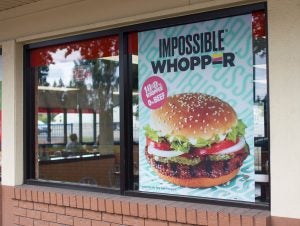Agriculture is no stranger to negative advertising. Many companies have used commercials to vilify modern farming. Bud Light. Stonyfield. Chipotle. FAGE. Only Organic. Chipotle. Panera. Hunt’s. Chipotle.
And now we can add Burger King to the list.
The fast-food chain released a musical commercial boasting of its efforts to reduce climate change. How? It supported some research looking at how a cow’s diet influences its carbon emissions. Burger King tells us that when cows eat lemongrass, they produce less methane. So BK rules the fast-food chains when it comes to climate change.
It isn’t surprising that the commercial caused rage by the ag community. The music was bad. The dancing was bad. The information was misleading. And it blamed animal agriculture for climate change. It’s almost like they wanted us to be angry.
What’s so perplexing though is why a company would do this. Surely there are plenty of companies that used anti-agriculture marketing and suffered as a result. Bud Light’s Super Bowl commercials are the perfect example that if you bite the hand that feeds you (quite literally!), you’re going to have problems.
Perhaps Burger King wanted to engage in some worthy activism. People are increasingly concerned about climate change. So they can impress people by sharing how they’ve invested money in relevant research that’s already yielding results.
The idea is plausible. But Burger King’s efforts are nothing more than virtue signalling. Agriculture as a whole — growing crops, livestock, horticulture, aquaculture, and all the rest — only causes 10 percent of all greenhouse gas emissions. Transportation and electricity contribute over 50 percent. If Burger King wanted to actually make a difference, it would do something about the 24-hour lighting in its stores and all the running cars in its drive-thru.
Besides, it isn’t even clear that Burger King’s sponsored research supports the lemongrass-is-better theory. Turns out the results were mixed, not the roaring success the BK commercial alludes to. And while reducing methane emissions is a good thing, it’s nowhere near the impact of reducing CO2 emissions from vehicles. In other words, we’re focused on the wrong thing!
Worth noting: @ucdavis is mentioned in the research. @ErmiasKebreab and his lab worked hard on this project, and did not see a reduction of 33 percent. The results were inconclusive. There’s still more work to do! https://t.co/UeyErdsjEc
— Frank Mitloehner (@GHGGuru) July 14, 2020
Maybe Burger King thought it was doing farmers a favor. They can show us how to change our production practices to reduce our environmental impact and be good stewards of the Earth. BK just wants to be an ally!
But farmers don’t need someone else telling them how to raise food. We already have hosts of experts to consult. These people have been specifically educated on how to care for animals, grow crops, and make us more sustainable. We’re already doing research and trying new things. And we’re already seeing results: the Food and Agriculture Organization of the United Nations found that overall greenhouse-gas emissions from U.S. livestock have declined 11.3 percent since 1961. The kicker? Our production of meat has more than doubled during that same time.

Or maybe Burger King is on the anti-meat bandwagon. I know, it’s certainly a weird position given that the restaurant chain is known for its burgers (heck, “burger” is even in their name). But hear me out.
Burger King was the first fast-food chain to offer the Impossible Whopper. It’s now offering the Impossible Sausage on its breakfast menu. At first it seemed like a novelty to get people in the door: try this plant-based burger! But combined with Burger King’s recent actions, the relationship deserves another glance.
That means we can look at Impossible Foods for guidance on how Burger King really feels. The Impossible line of products are plant-based foods that are supposed to closely mimic real meat (they even bleed!). Impossible’s CEO, Pat Brown, isn’t shy about his feelings on animal agriculture. He’s outrageously called it the “most destructive technology ever.” And he’s repeatedly shared his goal that plant-based meat would completely end animal agriculture within 15 years.
Is that Burger King’s end goal? It’s the only option I see that makes any sense, even if it initially sounds crazy. Burger King might be positioning itself for a future world of meatless burgers. Regardless, agriculture needs to keep an eye on these developments.
Amanda Zaluckyj blogs under the name The Farmer’s Daughter USA. Her goal is to promote farmers and tackle the misinformation swirling around the U.S. food industry.



